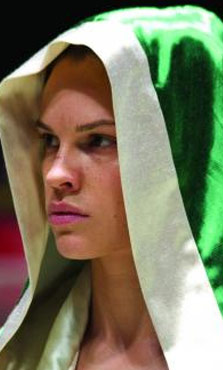 A movie like Clint Eastwood’s “Million Dollar Baby” is so simply and elegantly made it puts to shame nearly everything else in the multiplexes. Here is a “Just Add Water” film if ever one existed. Its core ingredients are three fine actors—featuring Hilary Swank in a better performance than the one she gave in “Boys Don’t Cry”—who are given room to express a range of emotions to embellish a competent script. Throw in a director smart enough to stay out of their way and sets and cinematography that build an inhabitable world. Eastwood makes it all look easy. ‘Baby’ is nothing more than a robust, conventional film—and how welcome it is! A movie like Clint Eastwood’s “Million Dollar Baby” is so simply and elegantly made it puts to shame nearly everything else in the multiplexes. Here is a “Just Add Water” film if ever one existed. Its core ingredients are three fine actors—featuring Hilary Swank in a better performance than the one she gave in “Boys Don’t Cry”—who are given room to express a range of emotions to embellish a competent script. Throw in a director smart enough to stay out of their way and sets and cinematography that build an inhabitable world. Eastwood makes it all look easy. ‘Baby’ is nothing more than a robust, conventional film—and how welcome it is!
True, its conventional side is occasionally a problem. Besides a surprising detour after the film’s mid-way point, which almost bisects it into two different films, the story follows a flat dramatic trajectory that flies perilously close to the hackneyed and the sentimental. Eastwood trusts the intrinsic integrity of his actors to pull the movie back from the brink.
Take the “Mo Cuishla” subplot. Improbably teased to its breaking point, the culmination of Eastwood’s withholding of the meaning behind her Gaelic nickname nearly ruins the ending. When he finally tells her, it’s close to the most revolting excesses of Hallmark Showcase TV Specials. I half expected a flashing graphic on the bottom of the screen announcing “Attention Academy Voters: Oscar Moment!” But the scene works because everything up to that point is marked by understatement and delicacy. “My darling, my blood”: nothing wraps up Eastwood and Swank’s paternal/romantic relationship better than those words used in just that situation. It’s earned.
One of the compelling aspects of “Million Dollar Baby” is the bareness of the fight scenes. Boxing movies normally exhibit an anxiety over the genre of which they are a part. The less cerebral films suffer in the shadow of “Rocky”, while the more stylized offerings usually crib from “Raging Bull”. In both cases the emphasis is on more: outdoing the precursors by having more blood, more sweat, more delirious violence. The one-upsmanship becomes a distraction.
In ‘Baby’, Eastwood keeps the boxing sequences spare. Only occasionally do the fights seem visceral. Their deliberately muted airiness places characters over sporting thrill. The ring dialogue between Eastwood and Swank is always easy to hear, for example, much like a play in which a bout is put onstage and the audience merely a faint background recording. Even when the London crowd chants her name, no part of their verbal exchange in the ring is lost.
This is a clue as to why Eastwood’s films are so good, and particularly so for actors. At all times his directing faithfully foregrounds the characters and the story. Many directors stuff their films to bursting point with stylistic flourishes, but as a director Eastwood chooses to vanish into A-B-C storytelling. The quiet spells in the movie form a subtle pattern of ommissions that recall an arid prose style like Hemingway’s. The story unfurls withs the patience and control of a master. “Million Dollar Baby” is Eastwood at the top of his game. |